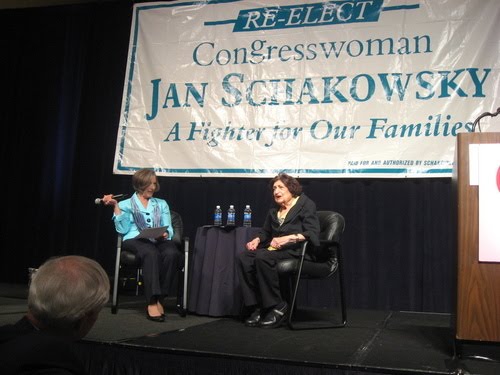The New Yorker‘s Connie Bruck tackles the question of whether the powerful pro-Israel lobby group AIPAC (American Israel Public Affairs Committee) is losing influence among American Jews. She frames the issue as if AIPAC is siding “with Netanyahu against Obama,” not–more accurately–about whether Obama’s more hostile approach to Israel is pushing AIPAC, and supporters of Israel in general, away from the administration.
Along the way, Bruck notes the congressional race in 2010 in which I challenged incumbent Democrat Jan Schakowsky in my old home town in Illinois. Bruck notes, correctly, that the far-left group J Street–which often adopts anti-Israel postures, including support for the Goldstone Report and opposition to Iran sanctions–likes to describe Schakowsky’s win as a sign that legislators who are soft on Israel need not fear a pro-Israel backlash.
A better measure would be the special election for the open seat vacated by Anthony Weiner in New York’s 9th district, where Republican Bob Turner won an historic victory in 2011, running largely against Obama’s policies on Israel, using much the same playbook that we used in Illinois. Oddly, Bruck leaves that New York race out. There are also a few facts that Bruck–who did not approach me for comment–has missed about that 2010 race.
In Bruck’s telling (excerpted in full, below), I challenged Schakowsky as “insufficiently supportive of Israel.” That is how Schakowsky likes to tell the story. The reality is that it was Schakowsky’s support for J Street that triggered a revolt among some of her former supporters and donors. The problem was not that she was not supportive enough of Israel, but that she was actively backing a group with a hostile, often anti-Israel agenda.
Bruck also leaves out one of the most important events in that campaign: Schakowsky’s decision to hold a large fundraiser honoring the late Helen Thomas, who was not only anti-Israel but also antisemitic. Thomas’s open hostility towards Israel was already a matter of public record when the fundraiser was held. Her rant against Jews a few weeks later caused huge embarrassment to Schakowsky–who, nonetheless, held onto the money.
Since 2010, Schakowsky has indeed become less supportive of Israel–perhaps freed to be her true self. In a letter to constituents making the Internet rounds, she declines to take Israel’s side in the ongoing war with Hamas, confessing her “anguish…as a Congresswoman with a large Muslim as well as Jewish constituency” but refusing to distinguish right from wrong. She wonders why she was booed in synagogues? There’s her answer.
More broadly, the problem in Bruck’s article is that she takes J Street’s self-definition as “pro-Israel, pro-peace” for granted. She notes that AIPAC, and Jewish leaders in general, are wary of the group, but does not explain why, and uninformed readers are left to conclude that the Jewish community simply cannot tolerate diversity of opinion on Israel. It is J Street, in fact, that is intolerant, insisting that it alone represents “pro-peace” Jews.
Recently, for example, J Street pulled out of a pro-Israel rally in Boston, a gesture that Alan Dershowitz cited as definitive proof that the group is more devoted to attacking Israel than supporting it, even at the most crucial moment. While J Street is fast losing credibility, the fact that it enjoys the backing of the Obama administration has driven a wedge into the Jewish community. By whitewashing J Street, Bruck misses the crux of the story.
From Bruck’s article (linked above):
Jan Schakowsky, who has represented a liberal Chicago district since 1999, was another of J Street’s first endorsees. For years, she had maintained good relations with AIPAC, which gave money to her campaigns and praised her positions. She voted to condemn the Goldstone report and signed a 2010 letter urging the Administration to keep any differences with Israel private. But in her 2010 race, she was challenged by Joel Pollak, an Orthodox Jew, who argued that she was insufficiently supportive of Israel. “We were very much aware that AIPAC-associated people were fund-raising for Jan’s opponent,” Dylan Williams, the director of government affairs for J Street, said. A small but vocal contingent of AIPAC members were behind Pollak. But he was also backed by the Tea Party, which J Street believed might drive away other Jewish voters. The new lobby raised seventy-five thousand dollars for Schakowsky (through its PAC, whose financial contributions are publicly disclosed), and she won by a wide margin. “It was exactly the type of race we had hoped for!” Williams said. “A lot of the power of AIPAC is based on this perception, which I believe is a myth, that if you cross their line you will be targeted, and your opponent in your next race will receive all this money, and it will make a difference.” Still, Schakowsky told me, the process was painful. “Getting booed in a synagogue was not a pleasure,” she said. “This is not just my base–it’s my family!” She added, “Increasingly, Israel has become a wedge issue, something to be used against the President by the Republicans, and it can be very unhelpful.”

COMMENTS
Please let us know if you're having issues with commenting.